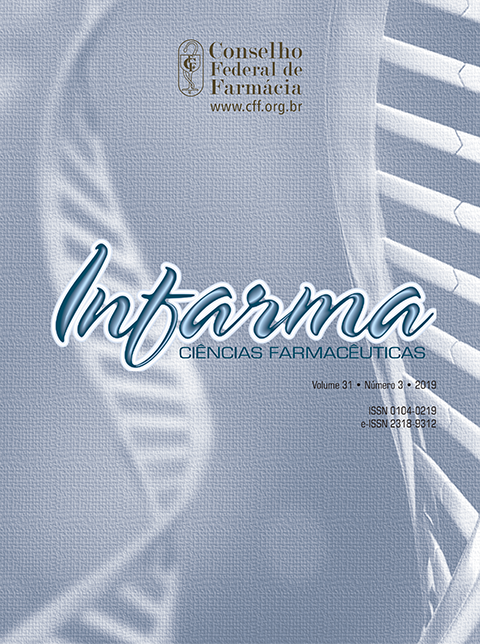QUALITY CONTROL OF 2% KETOCONAZOLE SHAMPOOS IN COMPOUNDING PHARMACIES IN PORTO VELHO, RO, BRAZIL
DOI:
https://doi.org/10.14450/2318-9312.v31.e3.a2019.pp155-162Keywords:
shampoo, quality analysis, pharmacies masterful, ketoconazole 2%Abstract
Shampoos are products for cleaning or fixation of substances with dermatological action. Ketoconazole shampoos have the purpose of treating and preventing fungal infections caused by Malassezia globosa. Due to these are high-consumption shampoos it is necessary to confirm the quality of the products handled in the compounding pharmacies. The objective of this work was to perform quality analyzes of the ketoconazole shampoos from compounding pharmacies in Porto Velho, RO. Organoleptic analyzes, hydrogenionic potential (pH), density determination, viscosity, foaming potential, centrifugation test, and spectrophotometric assay were performed. The five samples were satisfactory for the organoleptic analysis; about pH, only sample B fit within the standards. About density, samples A and C were satisfactory. Considering viscosity, only E was unsatisfactory; and foaming power and dosing were not acceptable for samples D and E. In the centrifugation test formulations A, D and E produced precipitation.
Downloads
Published
How to Cite
Issue
Section
License
Authors who publish in this journal agree to the following terms:
- Authors retain the copyright and grant the journal the right of first publication, with the work simultaneously licensed under the Licença Creative Commons Attribution which allows the sharing of work with acknowledgment of authorship and initial publication in this journal.
- Authors are authorized to take additional contracts separately, for non-exclusive distribution of the version of the work published in this journal (e.g. publish in institutional repository or as a book chapter), with acknowledgment of authorship and initial publication in this journal.
- Authors are allowed and encouraged to publish and distribute their work online (e.g. in institutional repositories or on their personal page) at any point before or during the editorial process, as this can generate productive changes as well as increase the impact and Citation of published work (See O Efeito do Acesso Livre ).


